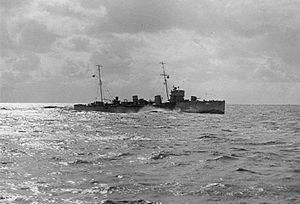HMS Firedrake (1912)

HMS Firedrake during World War I
|
|
| History | |
|---|---|
|
|
|
| Name: | HMS Firedrake |
| Builder: | Yarrow & Company, Scotstoun, Glasgow |
| Yard number: | 1304 |
| Launched: | 9 April 1912 |
| Honours and awards: |
Heligoland 1914 |
| Fate: | Sold for scrap on 10 October 1921 |
| General characteristics | |
| Class and type: | Acheron-class destroyer |
| Displacement: |
|
| Length: | |
| Beam: | 27 ft 7 3⁄4 in (8.43 m) |
| Draught: | 8 ft 6 in (2.59 m) |
| Installed power: | 20,000 shp (15,000 kW) (design) |
| Propulsion: |
|
| Speed: |
|
| Complement: | 72 |
| Armament: |
|
HMS Firedrake was a modified Acheron-class destroyer, named after the firedrake of Teutonic mythology, and the sixth ship of the Royal Navy to bear the name.
Sir Alfred Yarrow maintained that it was possible to build strong, seaworthy destroyers with a speed of 32 kn (59 km/h), and a contract for three such boats was placed with Yarrow & Company of Scotstoun, Glasgow. The "Firedrake Specials", "Special I class" or "Yarrow Specials" were a little larger than the rest of the class but carried the same armament. Firedrake, Lurcher and Oak were, however, distinctive in appearance and at least 4 knots (7.4 km/h) faster than the rest of their class. They all exceeded their contract speed, Lurcher making over 35 knots (65 km/h). Firedrake became part of the 1st Destroyer Flotilla.
During the Curragh Incident in the spring of 1914, Firedrake was despatched to Kingstown (now Dún Laoghaire in the Republic of Ireland) in order to preserve communications between Lieutenant General Sir Arthur Paget in Dublin and the British Government in London. She left Southampton at 10:30pm on 19 March, making the passage in record time. The Unionists suspected that the naval movements were part of a plot to subdue Ulster, and Firedrake's captain, Lieutenant Commander B W Barrow, was ordered to report to Paget's Headquarters in civilian clothes.
...
Wikipedia
